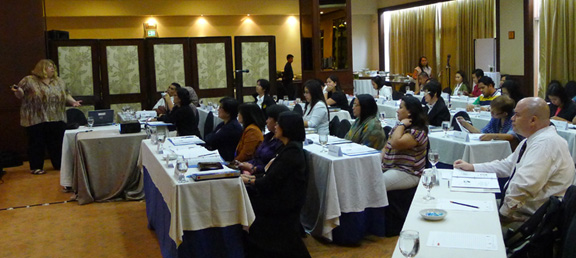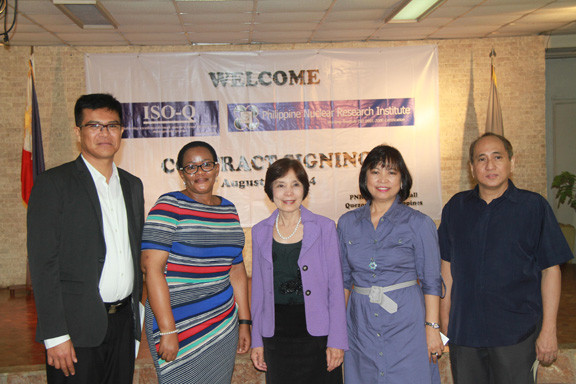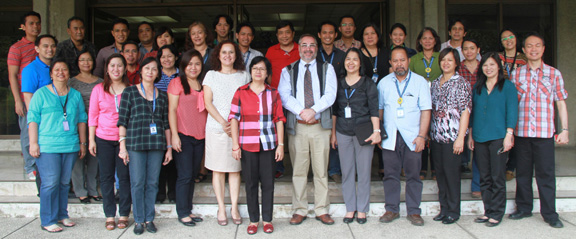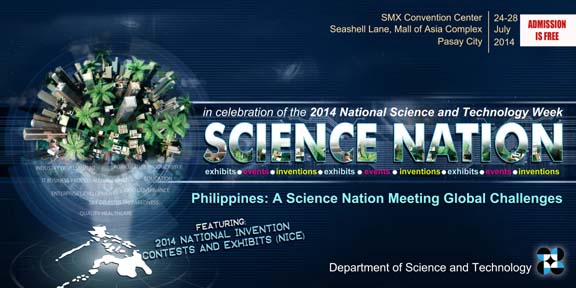PNRI Experts at the National Workshop on Irradiation as a Phytosanitary Treatment
- Details

The Philippine Nuclear Research Institute – Department of Science and Technology (PNRI-DOST) shared and demonstrated its expertise in irradiation technology and radiation processing during the National Training Workshop on Irradiation as a Phytosanitary Treatment held at the Intercontinental Hotel Manila, Makati City from September 16 to 18.
The workshop, which was organized by Department of Agriculture – Bureau of Plant Industry (DA–BPI) in collaboration with PNRI and the United States Department of Agriculture - Animal and Plant Health Inspection Service (USDA – APHIS), aimed to improve the knowledge and technical competence of local quarantine officers regarding the use of irradiation as a phytosanitary treatment against insects. These include dose mapping for determining the proper irradiation dose and exposure time of products, as well as safety and quality procedures in irradiation facilities, among others.
Read more: PNRI Experts at the National Workshop on Irradiation as a Phytosanitary Treatment
PNRI Signs MOU for Non-Destructive Training Program in South Africa
- Details

The Philippine Nuclear Research Institute – Department of Science and Technology (PNRI-DOST) signed a Memorandum of Understanding (MOU) with the South African consultancy firm ISO-Q for collaboration in conducting Non-Destructive Testing (NDT), nuclear and radiation safety training programmes in South Africa on August 14 at the PNRI Compound.
The PNRI will be in charge of providing lecturers and experts on NDT, nuclear and radiation safety to South Africa to facilitate the training programme, as well as the development of manuals, syllabi and other training materials for the participants. The ISO-Q consultancy firm will handle the logistics, including the venue, equipment and the travel and living expenses of the PNRI lecturers.
ISO-Q has also committed to help develop the NDT program in the Philippines through donations for facility upgrades, additional equipment and human resources development.
ISO-Q is a private firm in South Africa which provides consultancy and training services in developing safety, health, environmental, risk and quality management.
National Workshop on the Logical Framework Approach
- Details

Aiming to improve the skills of our scientists and professionals in crafting well-formulated and well-written proposals for both national and international projects, the Philippine Nuclear Research Institute – Department of Science and Technology (PNRI–DOST) in cooperation with the International Atomic Energy Agency (IAEA) hosted a National Workshop on the Logical Framework Approach for TC Project Design from July 8 to 11 at the PNRI Compound in Quezon City.
Project leaders and other participants from PNRI, National Power Corporation (NPC), Jose Reyes Memorial Medical Center (JRMMC), Philippine Society for Nuclear Medicine (PSNM), Philippine Council for Health Research and Development (PCHRD–DOST), Bureau of Soils and Water Management–Department of Agriculture (BSWBM-DA), Philippine Atmospheric Geophysical and Astronomical Services Administration (PAGASA–DOST) and the Environmental Management Bureau – Department of Environment and Natural Resources (EMB–DENR) were divided into teams as they engaged in step-by-step activities in building a solid framework as a basis for their respective projects.
Read more: National Workshop on the Logical Framework Approach
Nuclear Technologies to be Featured at 2014 NSTW Celebration
- Details

Nuclear technologies, state-of-the art facilities, services and products that help boost competitiveness of local industries and for more accessible and improved healthcare will be featured by the Philippine Nuclear Research Institute-Department of Science and Technology (PNRI-DOST) at the exhibits and forum during the National Science and Technology Week (NSTW) celebration at SMX Convention Center, Mall of Asia on July 24 to 28, 2014.
The activities for this year’s NSTW celebration will focus on the theme Philippines: A Science Nation Meeting Global Challenges.
PNRI experts will also present radiation technologies that have numerous beneficial applications in a techno forum entitled “Radiation: May Benepisyo Ito!” on July 25, 10:00 am to 12:00 nn at Forum Hall 2 of SMX. The topics to be presented are on nuclear-based and isotopic nuclear analytical techniques to ensure food safety and traceability, applications of electron beam and gamma irradiation.
The public is invited to attend the forum and view the nuclear technologies exhibits at DOST Outcome 3 – Industry Competitiveness and DOST Outcome 6 – Quality Healthcare which will also feature the technologies, services and products of various DOST agencies. Admission to the NSTW exhibits and forum is free.
Read more: Nuclear Technologies to be Featured at 2014 NSTW Celebration












































